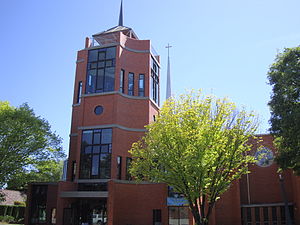The Commonwealth Bank has won a long-standing court case against the Bathurst Anglican Diocese (the organisation of Anglicans in Western NSW) which now faces having to sell its property.
A key part of the court case hinged on whether a “letter of comfort” signed by then Bishop Richard Hurford made the Diocese responsible for the debts. The court has ruled that it does.
Justice David Hammerschlag also rejected the diocese representatives’ claim that, “The Diocese is not a legal entity and therefore cannot enter contracts” and that the bank had sued the wrong parties, and that its claim against the diocese was unenforceable.
This is similar to the “Ellis defence” used previously by some bodies in the Catholic church to deny liability in abuse cases. The Catholic church has undertaken not to use it any more.
The Church’s Anglican Development Fund (ADF) borrowed $40m from the bank and used $28m of it to fund two new church schools.
As Justice Hammerschlag puts it in his judgment handed down in the NSW Supreme court: “In 2007, it was decided that the Diocese would go, after a fashion, into the business of banking.” The ADF would borrow money in one big loan, and lend it out. “To put it mildly, the Diocesan banking enterprise did not fare well,” Justice Hammerschlag writes.
The schools in the towns of Orange and Dubbo were burdened with debt, enrolments did not meet targets and there were staffing problems.
They could not repay their loans. Receivers were called in and the schools have since been sold to the Sydney Anglican Schools Corporation which now runs them successfully.
Receivers were called into the ADF which after the sale of the schools owed the bank $25m. In a complicated chain of court cases, with various boards, board members and committees suing each other and the bank, the ADF emerged owing $14m.
The judgment means that the diocese now has to find the money to repay the bank. The court has ruled that the diocese will have to pass ordinances (rules) to collect the funds which almost inevitably means local church buildings will have to be sold.
Justice Hammerschlag has held the proceedings over until the new year to allow the parties to consult.
Christians who go to Anglican churches throughout Australia, not just in Western NSW have a stake in this case. Blogger David Ould, who has reported this case throughout the proceedings, puts it this way: “This will now be a test of the national church’s understanding of its own mutuality. To what extent should other dioceses get involved to help out? When the crisis first developed a financial advisory group went to meet with then Bishop Hurford. They were, it’s fair to say, sent packing. More recently at a General Synod (national peak body) Standing Committee meeting one member urged the Standing Committee to ‘either send a condolence card or stand shoulder to shoulder’. But which will it be?”
Email This Story
Why not send this to a friend?



